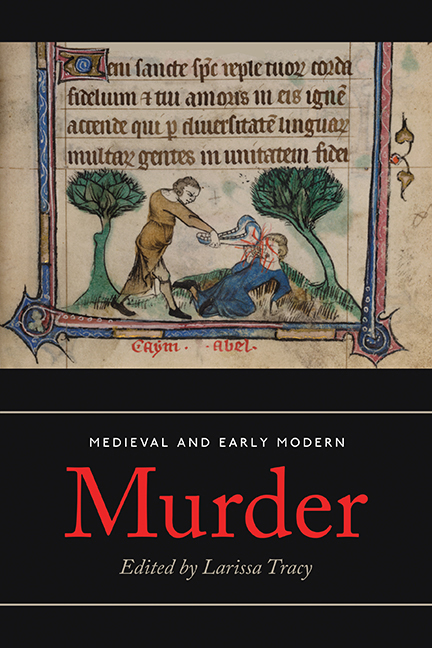Book contents
- Frontmatter
- Contents
- List of Illustrations and Tables
- Acknowledgements
- Contributors
- List of Abbreviations
- Introduction: Murder Most Foul
- I Murder on Trial: Justice, Law and Society
- II The Public Hermeneutics of Murder: Interpretation and Context
- 6 Bringing Murder to Light: Death, Publishing and Performance in Icelandic Sagas
- 7 ‘I Think This Bacon is Wearing Shoes’: Comedy and Murder in the Old French Fabliaux
- 8 ‘Chevaliers ocirre’: Manslaughter, Morality and Meaning in the Queste del Saint Graal
- 9 Murder, Manslaughter and Reputation: Killing in Malory's Le Morte Darthur
- 10 Poisoning as a Means of State Assassination in Early Modern Venice
- 11 Defamation, a Murder More Foul?: The ‘Second Murder’ of Louis, Duke of Orleans (d. 1407) Reconsidered
- 12 ‘A general murther, an universal slaughter’: Strategies of Anti-Jesuit Defamation in Reporting Assassination in the Early Modern Period
- III Murder in the Community: Gender, Youth And Family
- Conclusion
- Select Bibliography
- Index
9 - Murder, Manslaughter and Reputation: Killing in Malory's Le Morte Darthur
from II - The Public Hermeneutics of Murder: Interpretation and Context
Published online by Cambridge University Press: 05 July 2018
- Frontmatter
- Contents
- List of Illustrations and Tables
- Acknowledgements
- Contributors
- List of Abbreviations
- Introduction: Murder Most Foul
- I Murder on Trial: Justice, Law and Society
- II The Public Hermeneutics of Murder: Interpretation and Context
- 6 Bringing Murder to Light: Death, Publishing and Performance in Icelandic Sagas
- 7 ‘I Think This Bacon is Wearing Shoes’: Comedy and Murder in the Old French Fabliaux
- 8 ‘Chevaliers ocirre’: Manslaughter, Morality and Meaning in the Queste del Saint Graal
- 9 Murder, Manslaughter and Reputation: Killing in Malory's Le Morte Darthur
- 10 Poisoning as a Means of State Assassination in Early Modern Venice
- 11 Defamation, a Murder More Foul?: The ‘Second Murder’ of Louis, Duke of Orleans (d. 1407) Reconsidered
- 12 ‘A general murther, an universal slaughter’: Strategies of Anti-Jesuit Defamation in Reporting Assassination in the Early Modern Period
- III Murder in the Community: Gender, Youth And Family
- Conclusion
- Select Bibliography
- Index
Summary
IN THE ARTHURIAN SOCIETY of Sir Thomas Malory's Le Morte Darthur (c. 1471), both the enforcement of social order and the accrual of social status are largely achieved by means of violence. Living in fifteenth-century England, Malory no doubt witnessed, and may have participated in, the familial feuds of that century that culminated with the Wars of the Roses in the 1460s and 1470s. Malory himself was charged with several crimes and was often incarcerated, and it is likely that he had some familiarity with English law. As Larissa Tracy explains in the introduction to this collection, throughout the medieval period, ‘murder’ (or unpardonable homicide) referred to intentional homicide committed from ambush or in secret, and Malory's treatment of the crime reflects that definition in his conception of the Arthurian past. Those who murder in Malory's work are usually motivated by pride and reputation, the defence of family honour or an individual knight's sense of ‘worship’. When the satisfaction of honour cannot be achieved by lawful means, King Arthur's knights will at times resort to murder, giving rise to the potential for an escalating cycle of fatal vengeance and posing a threat to the cohesiveness of the Round Table. To counter that threat and encourage adherence to the law, King Arthur formulates the Pentecost oath, the only formally expressed code defining chivalric behaviour in the Morte. The oath prohibits Arthur's knights from resorting to murder and requires them to grant mercy to whomever asks it, but the pledge proves an insufficient deterrent. However, King Arthur's prominent knights are rarely tried for murder, while Queen Guinevere is, and murder in Malory's work becomes not so much a legal charge as an appellation, a name that adversely affects the level of worship an individual knight may reach within his career. Gawain's reputation as a murderer, which Malory chooses to construct, creates factionalism within the Round Table, and when many knights reject him on that basis in favour of Lancelot, their final feud over the death of Sir Gareth and the resulting division among Arthur's knights plays a crucial role in the destruction of Arthur's kingdom. Malory creates an imagined version of Arthurian chivalry, which relies upon a system of ritualised violence, and in creating it, he must negotiate whether law can be impartially and consistently applied in that society.
- Type
- Chapter
- Information
- Medieval and Early Modern MurderLegal, Literary and Historical Contexts, pp. 206 - 226Publisher: Boydell & BrewerPrint publication year: 2018



